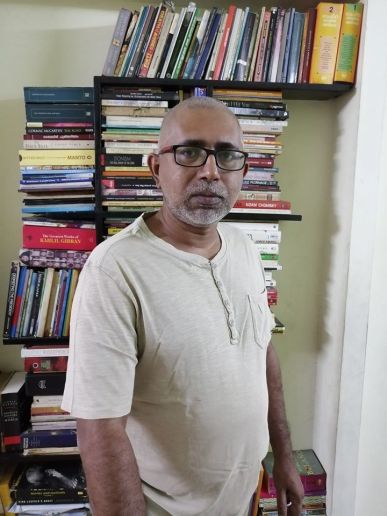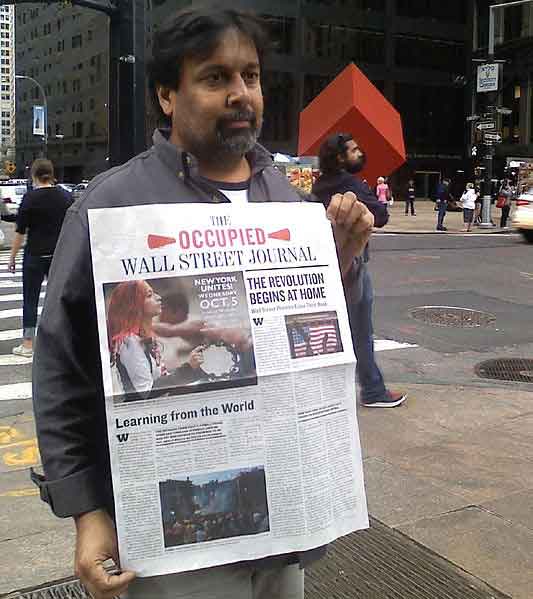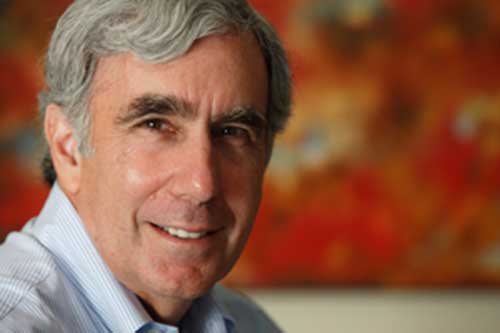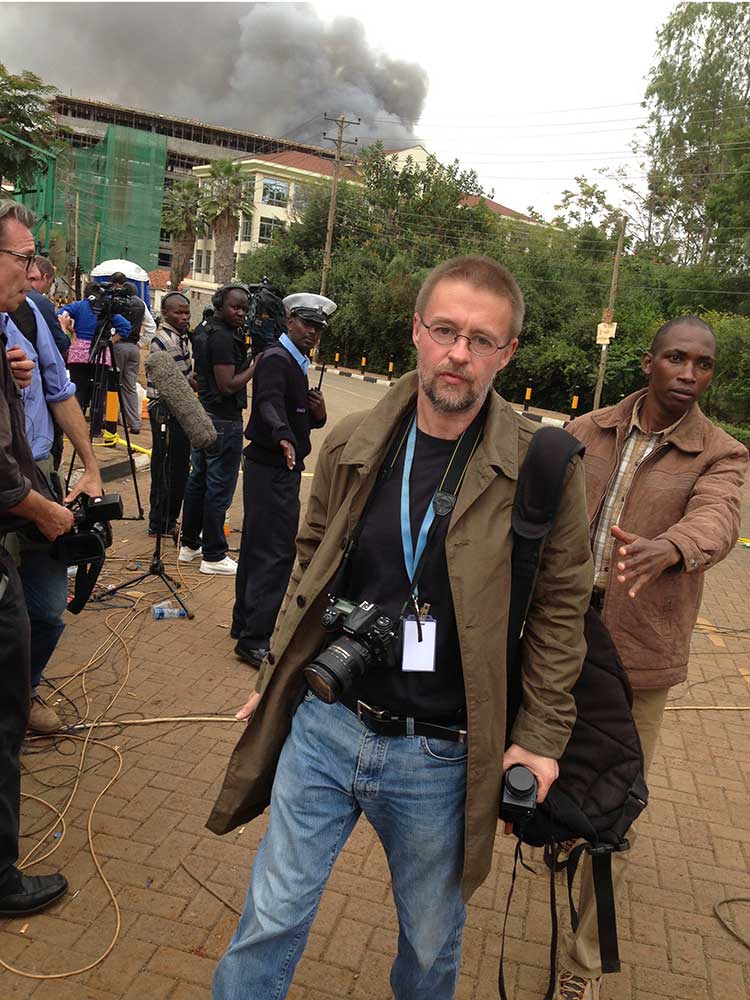
Can you interview an online site?
You can’t. So, I did the next best thing. I interviewed Binu Mathew, the man behind the award-winning million readers a month or three million-page views a month online journal, Countercurrents. Mathew claims this is not a big thing except that his journal is based on ideology and openness. He calls it a “people’s journal” in his you tube interview.
He has also started a ‘People’s Manifesto‘, a campaign that will be released by August 15, 2020. He is asking people to give an alternative vision to the government for a post-COVID 19 India. Mathew grew up in a farm on Kerala and turned to journalism. He has talked of his life in an interview with John Scales Avery, a theoretical chemist who is a part of the Nobel Peace Prize winning Pugwash Conferences.
Mathew is a man who finds links and interlinks between major world issues from climate change, COVID to economics and politics. What impresses me most about Mathew is that while almost all writers and journalists see their journeys at an individual level, he completely identifies with his journal and lives by his ideology. Here in this exclusive, we have Mathew himself unravel his ideology.
You have been running Countercurrent.org for 18 years. Tell us how it was conceived and why?
I was working as a journalist in Malayalam language news paper. It was a mundane job. Although the job gave me some financial security, it didn’t satisfy my intellectual curiosity. My desire to do something positive for the society kept nagging me. The job itself was a monotonous one, doing local beats and making local pages.
Some of my college mates and I had some discussions about starting an alternative weekly or monthly in Malayalam language. But the financial cost was huge, and it was beyond our capacity.
By the year 2000, internet infiltrated into our homes. There I chanced upon Znet, Electronic Intifada and many such fascinating websites. It was a revelation to me. Znet was a great source of left intellectual literature. Noam Chomsky, the rock star of intellectuals was free to read at the click of a mouse. In those days it was very expensive to buy books by Chomsky. In other websites, I found people telling stories from Palestine and other conflict zones.
In around the same time, I read the book, When Corporations Rule The World by David Korten. It was an eye opener. I thought I had to do something more than doing the local beats for my paper. Internet gave me the opportunity to do this. I decided to start a website like Znet.
I had zero knowledge in computing language. So I joined a basic html course. I and some of our friends had a brain storming session and decided on the name “Countercurrents“. I took a loan from bank and bought a computer. It was a 20GB hard disc, 256 MB RAM computer. It cost me Rs 40,000 at 18% interest! I paid it back by monthly instalments from my salary.
It was also the time a pogrom in Gujarat against Muslims was going on, in which at least 2000 Muslims were killed. We decided to launch the site as soon as possible.
Artist Razi designed the site, Ajith Kumar B converted it into html. I translated an article from Malayalam by the well-known writer Sarah Joseph titled, “The Womb and the Sword”, on the attack on pregnant Muslim women in Gujarat, in some cases where the pregnant women’s belly was cut open and the foetuses were thrown into the fire. That’s how I became the editor of Countercurrents. It was on March 27, 2002 the first article was published. Since then more than fifty thousand articles have been published. Thousands of well-known and young people have written for CC. Some of them went on to become big journalists or activists.
Tell us about your team and what makes you tick?
I don’t have a team to speak of. Most of the editing work is done by me. There are people like K.P Sasi and Satya Sagar who help me with their intellectual inputs. There are also many other people who are part of the Countercurrents Collective who don’t like to be named. In that way, I’m very fortunate and extremely thankful to them.
What is the philosophy of Countercurrents?
Humanity is facing its greatest existential threat ever with climate change and resource depletion and environmental degradation. This is not a crisis waiting to happen in the future, but it is already here and manifests itself in the COVID-19 pandemic we are facing today. Many resources wars continue to rage in several parts of the world, rising food and fuel prices, growing hunger, natural calamities of horrifying proportions, water scarcity, debt crisis, unemployment, social tensions among communities, growing human rights violations and unprecedented ecological degradation. Unless we take urgent action to change the way we live, trashing our only home, this beautiful planet, this crisis has the potential to wipe out the entire humanity and a majority of the other species from the face of this Earth.
The objective of Countercurrents.org is to spread awareness about this crisis and search for meaningful solutions. We believe that energy intensive globalization should end and it must be replaced by a low energy, ecologically sustainable local economies. If humanity is to survive, the destructive system of capitalism and consumerism must be replaced by an economic system which is based on just equitable distribution and need based use of resources.
Your motto says —“Educate! Organise! Agitate!” How do you explain it?
Susan B. Anthony (February 15, 1820 – March 13, 1906), who was an American social reformer and women’s rights activist and played a pivotal role in the women’s suffrage movement said, “Organise, agitate, educate, must be our war cry.”
In the Indian context Dr Ambedkar gave the call “Educate, Agitate and Organise.”
We combined both the slogans and took as our motto —“Educate! Organise! Agitate!”
We thought of it as a revolutionary call for caste annihilation and women’s empowerment, two of the major concerns in the world today. It also envisages a new kind of journalism which ‘educates’ instead of entertains as in ‘infotainment’. Organisation is necessary for social change. Without organisation, we cannot make any social change. However, it is not the duty of Countercurrents to establish an organisation. We hope that an organisation would emerge organically from the masses. An example is ” Fridays For Future” initiated by Greta Thunberg. Countercurrents has been educating the world about the danger of climate change from its inception. It is happy to see organisations emerge organically, especially on critical issues like climate change. Agitation is the final push for social change. It will happen or it should happen. Otherwise, we are all going to perish.
You have many hallowed names attached to your journal, like noted intellectuals like John Scales Avery, Magsaysay award winners, Sandeep Pandey and Prafulla Samantara and social activist Ram Puniyani. What do you think made them pick your journal over others?
I respect and love all these people. They are regular writers of Countercurrents too. They must have seen Countercurrents as an engine of social change. Otherwise they would not have endorsed CC.
You have recently started a section called Citizenship Amendment Act and it has won some recognition from US universities. Can you tell us a bit about this initiative and the subsequent recognition? How will this recognition help Countercurrents or your initiative?
Countercurrents was covering the Citizenship Amendment Act from the initial days of this controversial pact and the resultant agitations across the country. We were happy to know that Ivy Plus universities in the US decided to include it in their digital library for the benefit of faculty and researchers. Their communication said, “The Ivy Plus Libraries Confederation has selected your website — https://countercurrents.org/tag/citizenship-amendment-act — for inclusion in its India’s Citizenship Amendment Act Protest Movement Web Archive. The Archive is an initiative developed by librarians at Columbia University, the University of Pennsylvania, and New York University, under the auspices of the Ivy Plus Libraries Confederation. The Archive contains material related to protests against India’s new Citizen Amendment Act and the National Register of Citizenship, and was created to preserve and expose this content for academic research in politics, religion, sociology, and interdisciplinary South Asian Studies.”
It is extremely heartening to have this recognition from such prestigious universities, especially in this age of fake news. This speaks volumes of the authenticity of the content Countercurrents publishes. By the way, Countercurrents is archived in the US Library of Congress too. That too is an immense recognition
What kind of contributors do you look for?
Whatever the articles that Countercurrents publishes have some insights, give a new perspective to the reader. We won’t publish articles that don’t fit this criterion. We have contributors from Nobel Prize winners to grade ten students. Achievements doesn’t matter. Insights matter.
What kind of readership do you have?
We have readership from around the world. I get emails from even a remote village of Nicaragua.
What do you see as the future of Countercurrents and your own?
The future is beyond our control. We do our best while we can is my motto, the rest is beyond our control. If I die tomorrow, I hope someone will be willing and capable enough to take over.
Mitali Chakravarty is the editor of Borderless Journal
Originally published in Borderless Journal
SIGN UP FOR COUNTERCURRENTS DAILY NEWSLETTER
















































